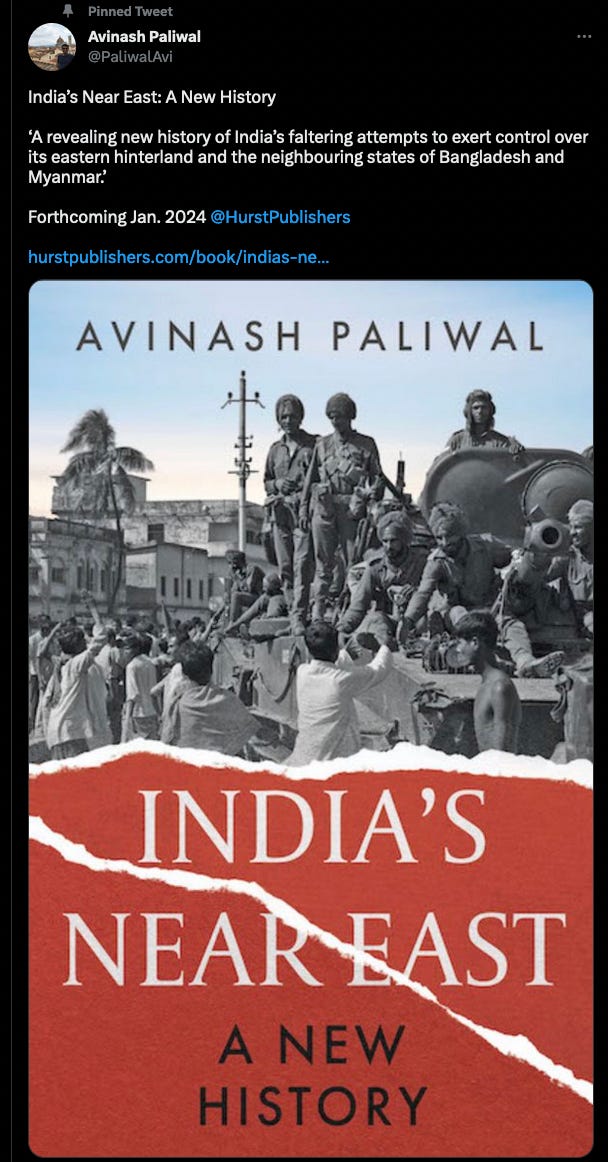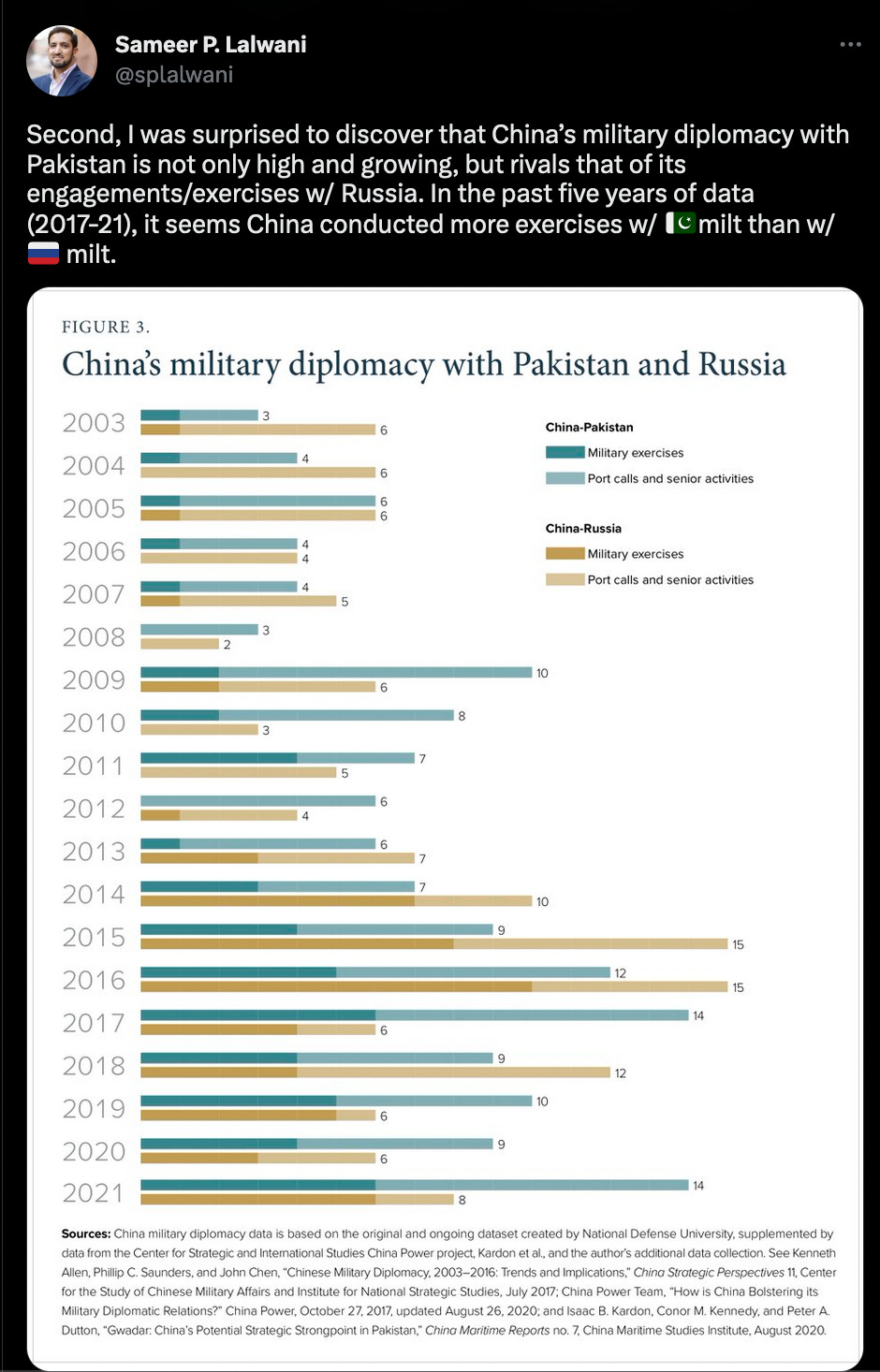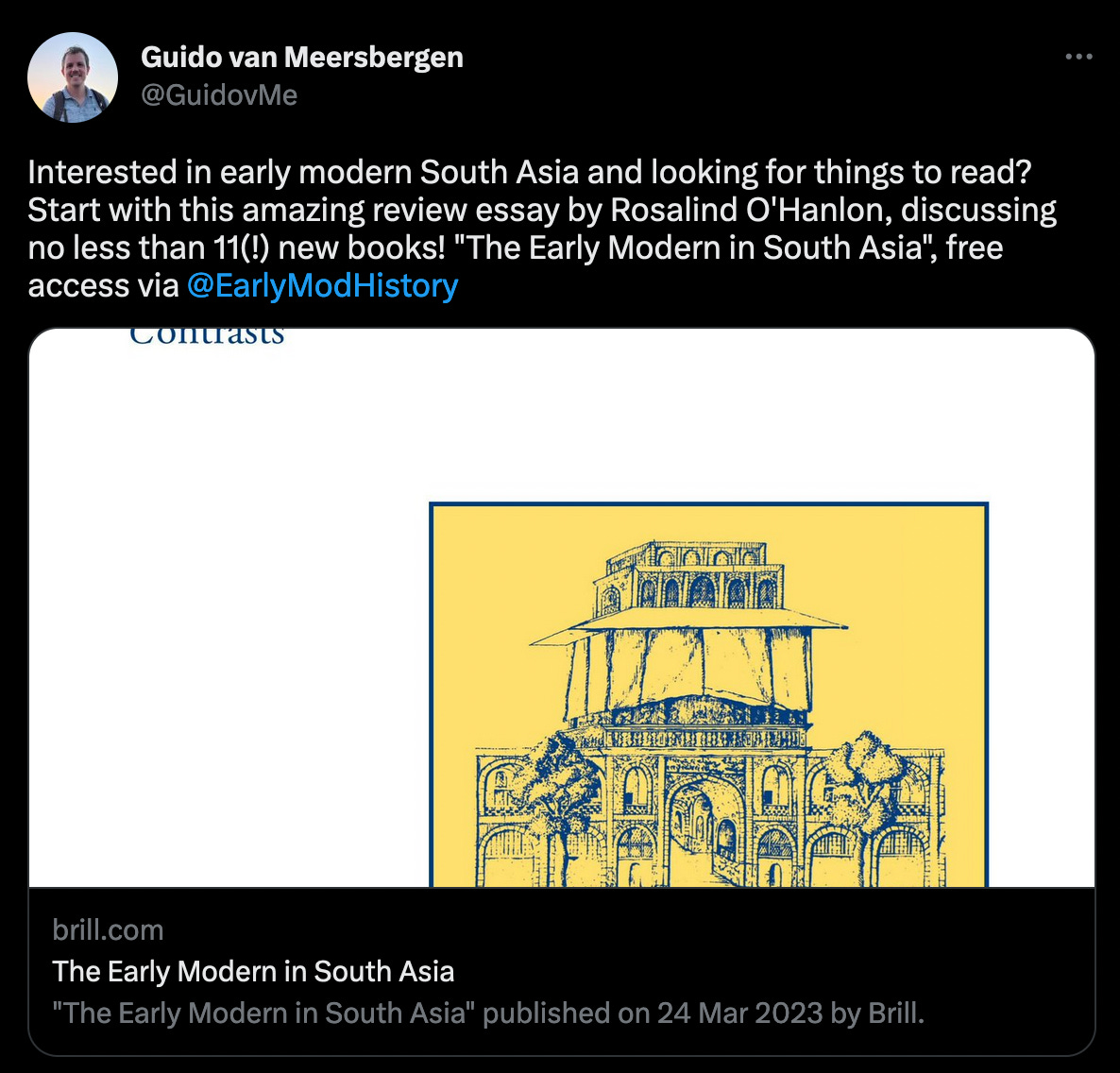CASI + Recommendation Corner + Navroz Dubash, Part 2 + Links
'Other countries have politics too'.
Work announcement: CASI
I’m now a Non-Resident Visiting Scholar at the University of Pennsylvania’s Centre for the Advanced Study of India, where I’m also a Consulting Editor, working on the fortnightly India in Transition publication. IiT aims to bring analysis and insights from scholars working on India, across disciplines, to a wider audience.
Starting this month, we have a four-part series on India in the Quad, beginning with Kate Sullivan De Estrada, director of the Contemporary South Asian Studies Programme at the University of Oxford (whose work also happened to come up in the last issue of the newsletter).
De Estrada writes about how India fits into the Quad – whose leaders are gathering in Sydney later this month for the annual Quad summit:
“India’s stakes in and through the Quad are obvious: via the Indo-Pacific construct and through membership of this exclusive quartet, New Delhi has seen a recent and swift elevation of its status and agency. Yet India’s inclusion within and leverage of a liberal vision for the Indo-Pacific is more complicated than it might initially appear. India—through both the discourse and the policies of its leaders—understands several aspects of the apparently shared Quad objectives of “freedom and openness” distinctively. What we see in the region—and what India supports—is a low-resolution liberal order. This visual metaphor portrays an order whose detail is weakly defined: an order whose normative content is therefore flexible rather than rigid in interpretation and that outwardly projects a “likemindedness” sometimes more superficial than deep.”
Please do check out India in Transition, and if you are a scholar working on India and would like to pitch a piece for the publication, do have a look at the submission guidelines here, and get in touch by writing to rohan.venkat@gmail.com
Recommendation Corner: Avinash Paliwal
Two years ago, I interviewed Avinash Paliwal, a senior lecturer in international relations and deputy director of the SOAS South Asia Institute, about how India should deal with the Taliban takeover of Afghanistan and the military coup in Myanmar. Although much has changed since then, the insights from the conversation with Paliwal – author of My Enemy’s Enemy: India in Afghanistan from the Soviet Invasion to the US Withdrawal – continue to remain relevant.
Go read the whole interview:
“In MEA, in R&AW and even India’s armed forces… I don’t think there is a lack of expertise on Afghanistan. Yes, of course, this is a community both within the government and outside that can be strengthened. In the larger context, India’s diplomatic corps are really small, given India’s ambitions and aspirations, but that is across the board – not just with Afghanistan.
But expertise isn’t really the handicap here. I think the serious handicap comes when policy suggestions reach the political leaders. I think there is not much interest. There is a very deep conservatism, to not explore things which have any risk associated with them.”
Excitingly, Paliwal has a new book coming out next year, one that we’ll undoubtedly feature on the newsletter.
I reached out to Paliwal to get a sense of what he’s reading, watching and listening to right now, for an occasional feature on the podcast called Recommendation Corner.
If you want to send in suggestions for books, podcasts, articles and videos connected to Indian foreign policy, politics, history or anything else you think might interest readers of the newsletter, write to me at rohan.venkat@gmail.com, or drop a comment below.
Here’s Avinash Paliwal:
The last year has been a bit of a whirlwind for me personally, coupled with a hectic teaching and writing load. I’m currently finalising the manuscript of my second book, and have not had the kind of bandwidth to read as much as I would’ve liked to. But, apart from course-related readings and diving into journal articles, some of the books I read over the last few months are.
A Golden Age by Tahmima Anam: Bangladeshi literature (in English) is an under-appreciated resource to make sense of the subcontinent. Just like the trauma of the 1947 partition is best understood by art and literature, the case of the 1971 liberation is the same. Anam’s book offers great emotional insight into the 1971 moment, and the fact that liberation was not a desire that everyone in the erstwhile East Pakistan held.
The Black Coat by Neamat Imam: This is a somewhat long, but essential book to make sense of the 1974 Bangladesh famine, and why the country whose liberation Bangabandhu campaigned for, turned against him within four years. One of the worst famine in the history of the subcontinent, 1974 shaped subcontinent in ways that’re little understood.
Victory City by Salman Rushdie: I’m currently reading this book, and can’t recommend it enough. It helps unpacking authoritarianism, the part-puritanical lurch of Indian politics, and the troubled pushback by those who seek to return India to its ‘original’ argumentative past.
Free: Coming of Age at the End of History by Lea Ypi: This autobiography had the deepest impact on me as a thinker and writer. Ypi grew up in communist Albania and witnessed its violent undoing during the 1990s. Her description of how left-wing authoritarianism operated in the last-standing socialist outpost gives one jitters. But the most powerful aspect of the book is how liberal capitalism isn’t the answer. What made the book potent for me was the fact that I could relate to both the communist vocabulary (I grew up in 1980s/90s India in a left-leaning family), and the failed promises of the so-called liberal order.
The Years by Annie Ernaux: It’s a shame that I’d not read Ernaux till she earned that well-deserved Nobel. But I’m glad I did. What a masterclass in writing history, and an autobiography, of post-war France.
Teen Couple Have Fun Outdoors by Arvind Jayan: This is a debut novel by Jayan, and a powerful tale of generational differences about sexuality, privacy, and values in a traditional Indian society that is yet to come to terms with the forces unleashed by the Digital Age.
Chip War by Chris Miller: This book has become a best-seller for good reason. It is the most accessible history of the microchip revolution, how that revolution is driven by global geopolitics and the Silicon Valley, and how it is (and continue to) shaping the world we live in. Must-read for anyone who has even basic interest in international relations.
The Hour of the Star by Clarice Lispector: Clarice is considered a great writer. But this book, for me, underscored what kind of writing I can’t keep up with. I would recommend this book to Scroll’s readers for its intellectual depth and Lispector’s rebellion against phrasing sentences and structuring paragraphs.
Pedro Paramo by Juan Rulfo: This is an extraordinarily powerful Mexican novel on patriarchy and power. Indian readers will find eery similarities.
I’ve been working on my second book: India’s Near East: A New History (London: Hurst Publishers, 2023/24) for the past seven years. It’s a geopolitical history of independent India’s eastward diplomacy and statecraft. Covering the entirety of India’s northeast, the two Bengals, and Burma, the book offers the first-of-its-kind narration of how India came to define itself and practice power in an communally partitioned region fraught with war, displacement, rebellions, and rivalry with China and Pakistan.
Apart from this, and my regular columns in the Hindustan Times and the Indian Express, I recently published a co-authored article in the International Studies Quarterly on India’s secret wars in South Asia and its conceptual implications for the study of state sponsorship of cross-border insurgencies. This is the first article that offers a theoretical treatment of India’s covert warfare since Independence.
I don’t listen much to podcasts, but I do watch a lot of cinema. Instead of offering a list of ‘to-watch’, I would recommend one series that I learned from, even though it’s not the best cinema or performance: CAT. This is a Punjabi web-series on Netflix created by Balwinder Singh Janjua. It offers a deep dive into the Khalistan movement in the 1980s/90s and how it shaped the life of a young man. The series offers troubling insight into the politics of Punjab, which is, unfortunately, all too relevant today.
‘Other countries have politics too’.
As I mentioned last month, I’m also an editorial consultant at the Centre for Policy Research, where I’m working on a series called CPR Perspectives – flagship interviews with the Centre’s faculty on their research, policy practice and engagement with the most critical questions of our age.
I’ve linked to the first part of my conversation with Navroz Dubash earlier. Here’s my favourite excerpt from the second part:
One thing I wondered about, going back to your first conversations at the Climate Action Network and beyond: Does the climate environment world also fall prey a bit to the elite mimicry or the simplifying and flattening that comes from relying mostly on Western views? We saw this with the Yale-Columbia index last year…
It’s a good question, because actually – and we’ve seen this in the IPCC also – the West dominates the research networks. It dominates the funding. Many of us tend to get trained there. They dominate the funding networks and also dominate the editorial boards of journals. And it’s not like anybody’s being malevolent here, but where you sit is where you stand. If you’re a US academic and you care deeply about climate change, then you tend to look at things through the lens of what will move the US Congress.
For the rest of us, ‘what will allow the US Congress to be progressive’ is a very limiting question. There was a whole decade when the main question was ‘how do we get India and China to do something, anything, such that we can go back to the US Congress?’ I tell my Western friends, ‘you know, other countries have politics too, and they are often more complicated.’
So one of the things when I came back to India is I made it clear that my objective was not going to be to sign up to research projects where I was asked to do the India chapter of a study that was conceptualized elsewhere. If I was going to be part of a study, I had to be part of the conceptualisation of it, and ideally lead the conceptualisation of it…
Where you sit is where you stand. So different people bring their different frameworks and that’s fine. The interesting thing is, how do you reconcile those and take seriously all those different perspectives, as opposed to anointing one of them the dominant perspective? It’s been an uphill battle including in the IPCC, right, because there are these highly powered, well-funded research teams that dominate the literature, they dominate the editorial boards.
I sit on something called the Emissions Gap Report’s Steering Committee for six or seven years. And every year, [I would say] if you want to inform what developing countries do, you must think about emissions choices as an adjunct to development choices. And I often get the pushback that says ‘this isn’t the development report’. I was like, ‘sorry, you’re missing the point’. These aren’t separable things, right? This battle for the narrative high ground is an important battle and ironically there is often a presumption that Indian academics who engage in international fora are just spewing out what we learn over there.
Go read the whole second part of the interview, or listen to it as a podcast here.
Linking Out
The links have been piling up, so instead of interpretative notes, I’m afraid this week is a little more of a straightforward link dump:
2024
Kiran Parashar provides background to the Amul vs Nandini row that played out ahead of elections in Karnataka. Voting takes place on May 10, with results due on May 13.
Manoj CG asks: will history turn for Congress again in Karnataka?
Liz Mathew on the BJP Parliamentary Board being kept out of key decisions at the state level.
Asim Ali on the key reasons why Uttar Pradesh Chief Minister Adityanath embodies the ‘Hindu sovereign’ role that makes him principal candidate to be Modi’s successor.
Girish Kuber on Sharad Pawar killing many birds with his ‘stepping down’ stone.
Inside
Esha Roya explains the violence in Manipur.
Ashutosh Varshney and Bhanu Joshi on Ram Navami and the violence that has accompanied the festival in recent years.
“The expectation that a less democratic, low-capacity State can endow itself with the capacity to do what the State ought to do in a complex and unequal social setting is a falsity spurred by a deep desire to legitimise undemocratic political regimes,” writes Yamini Aiyar.
Sukumar Muralidharan reviews Ashoka Mody’s India is Broken, and Why it is Hard to Fix: A People Betrayed, 1947 to Today.
India is getting an “eye-wateringly big transport upgrade”, says the Economist.
Rahul Pandita says that, in light of the Satya Pal Malik interview, the Opposition should not twist facts on Pulwama to score political points.
Anuradha Bhasin Jamwal argues that we ought to pay attention to Malik’s allegations.
Arunabh Saikia travelled “deep inside a forest in southern Chhattisgarh to investigate the allegations” that the Indian government bombed a village.
Outside
Which will grow faster: India or Indonesia, asks the Economist.
Sameer P Lalwani on China and Pakistan’s ‘Threshold Alliance.’
What even is the United States-India Initiative on Critical and Emerging Technologies? Rudra Chaudhari takes a look.
Gokul Sahni on the question: Why were the Soviets interested in Russia?
Suhasini Haidar argues that the 2007 LoC agreement – a template for a deal between India and Pakistan – deserves a re-look.
Patrizia Cogo Morales and Raquel Jorge Ricart on the EU and India’s Trade and Technology Council.
Constantino Xavier and Riya Sinha argue that Indian diplomacy needs much more financial firepower.
Pranay Kotasthane suggests ‘surge hiring’ for the Ministry of External Affairs.
Joe Wallen and Tushar Shetty have a new podcast on South Asia, called ‘Beyond the Indus’, beginning with episodes on Pakistan, the Khalistan question and how South Asia looks at the Ukraine war.
Everything Else
Sudipto Mondal on using the terms ‘Lowered Caste’ and ‘Shudra’ rather than ‘low caste.’
An utterly fascinating interview of Tamil author Jeyamohan by his translators Priyamvada Ramkumar & Suchitra Ramachandran.
Narayani Basu remembers Patrick French, the historian and biographer who died in March.
Nilesh Christopher finds India’s ‘Mr Beast’ – a vlogger who does stunt philanthropy.
“[Parkash Singh ]Badal’s journey in politics started with that of independent India... And it would go on to mirror that of Punjab itself — from the wars with Pakistan and the crackdown during Emergency, to the decade–long militancy in the 1980s, he weathered it all,” writes Manraj Grewal Sharma.
That’s it for this edition of India Inside Out. Send feedback, funny memes and great links to rohan.venkat@gmail.com







